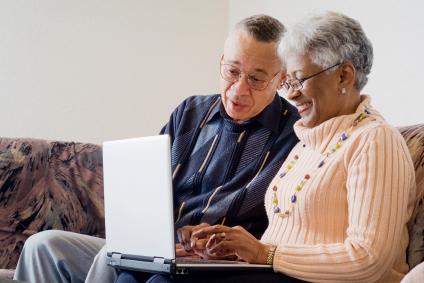
Today people of all ages can easily connect with family and friends, plan a trip or vacation, purchase and sell nearly whatever they imagine, and access all kinds of interesting and useful information, all thanks to the Internet. But, if you click onto the wrong sites online, it could cost you time, money, and more. With seniors, there is the added challenge of finding out how to use the Internet and avoid pitfalls with regards to disclosing personal information. Fortunately, seniors can usually get some internet guidance from a caregiver provided by a top quality home care company, such as Retire At Home, a companion care provider in Ottawa. Some important internet safety tips are highlighted below. Click here for more details.
Avoid Emails From People You Do Not Know
The same as real life mail and telephone scams, online scams typically use the same type of approach. The thing that makes emails more malicious is that they may include attachments that have viruses or some other malware that could possibly damage your personal computer or steal your information. One simple tip to follow is to never open messages, click links or download files from people you don't know. If you receive a suspicious email from somebody you do know, contact that individual first before clicking any links or downloading files. The individual may not be aware that their computer has been infected.
Analyze the Website Carefully
Even though many people understand how to spot bad actors when shopping in local stores and dealing face-to-face, smoking out bad websites is really a trickier deal. Hackers and scammers have been savvy enough to design websites that look legitimate and may even include links to legitimate companies or organizations. They can even produce documents which look authentic and official. One thing to keep in mind is that real organizations do not ask you for your password or other personal information, especially when it comes to banks. If uncertain, check with your local bank if they have indeed sent you an email. Apart from that, it's safer to delete the email entirely.
Log Out Before Closing the Page
It is always wise to log out of a site before closing the window when accessing your accounts and making any transactions. This is especially valid when using public computers. Some browsers and websites can be programmed to open the very last pages you accessed. If your account remained open, it gives hackers a chance to access your accounts and personal information. Also remember to disable any feature which allows the website to store passwords.
Install and Update Antivirus and Firewall Software
Very much the same as home care, making certain you're protecting the privacy of your personal information and safeguarding your personal computer while online is crucial. Seniors can keep their computers clean and secure by installing reliable anti-virus and firewall software. These can help check whether an email, file or website is safe to open, access or download. Remember that several viruses are created, propagated and discovered on a daily basis. It is important to keep your software current on a regular basis. Check the developer’s website at least once a week to download updates. In some instances, the software can automatically do this for you but you will have to schedule the activity and set a time when the program can access the Internet for updates.
Choosing the right health care provider is very important for seniors looking for senior care or home health care. Other than providing you with services to be able to live comfortably at home, they will also be able to give you tips on how to safely access the Internet. Do your research and perform background checks to ensure that you get the best services available.
No comments:
Post a Comment